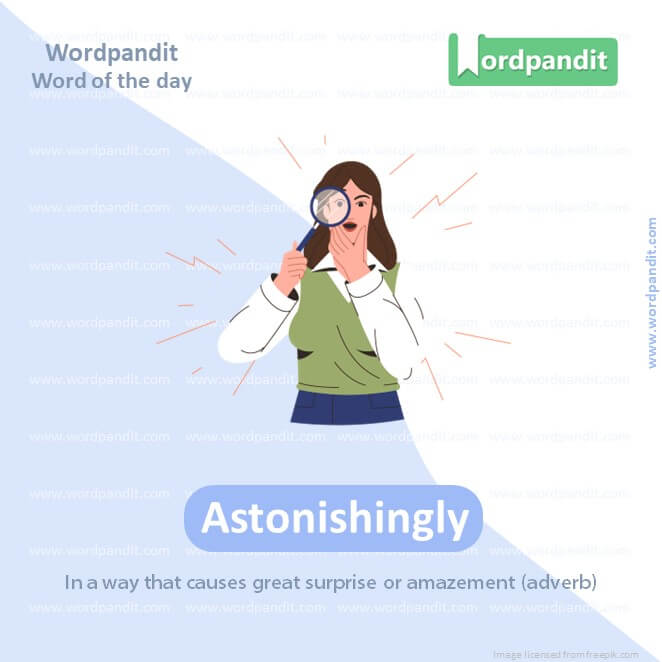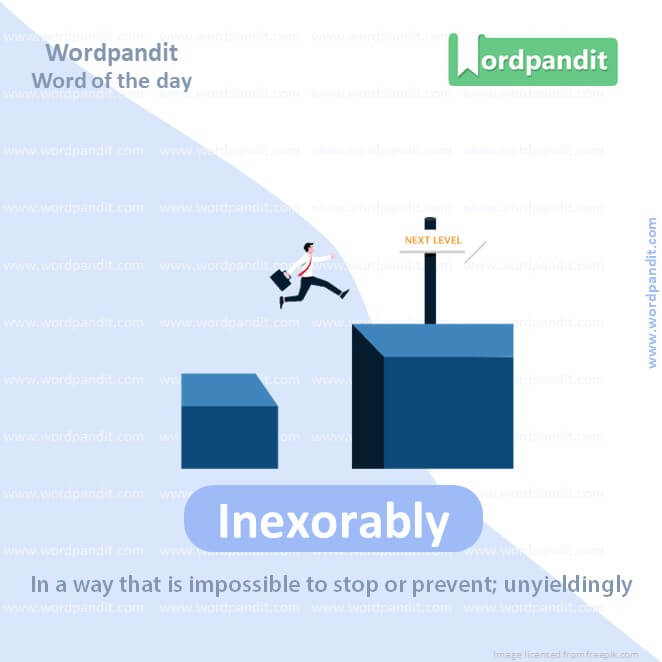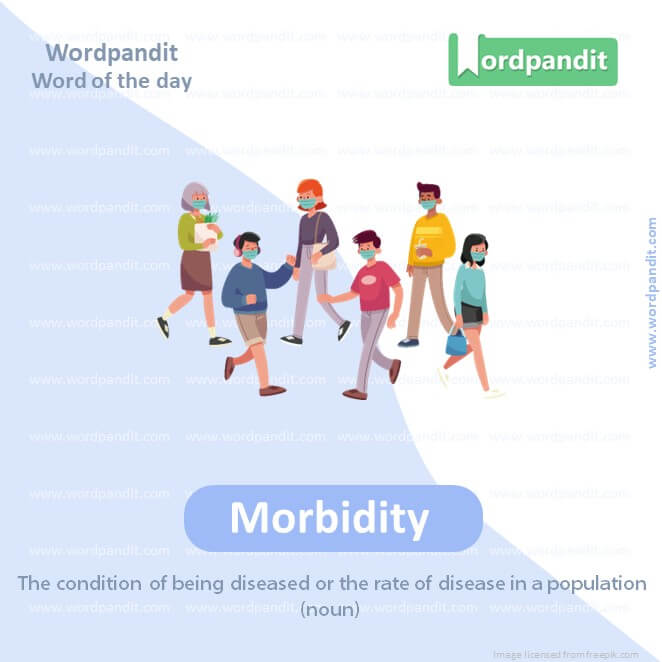Daily Vocabulary Words: List of Daily Used Words in Leading International Newspapers
Hi there. Welcome to this special section @ Wordpandit.
Our endeavour here is very simple: to highlight important daily vocabulary words, which you would come across in leading newspapers in the country. We have included the following newspapers in our selection:
• The New York Times
• The Washington Post
• Scientific American
• BBC
• The Guardian
• Psychology Today
• Wall Street Journal
• The Economist
We are putting in extensive work for developing your vocabulary. All you have got to do is be regular with this section and check out this post on a daily basis. This is your repository of words that are commonly used and essentially, we are posting a list of daily used words. Hence, this has significant practical application as it teaches you words that are used commonly in leading publications mentioned above.
Visit the website daily to learn words from leading international newspapers.

WORD-1: Astonishingly
CONTEXT: The news should have stopped us in our tracks. Astonishingly, however, it was scarcely reported here.
SOURCE: The Guardian
EXPLANATORY PARAGRAPH: Imagine you see a magician pull a rabbit out of a hat, and you’re so surprised your eyes go wide open. That’s “astonishingly.” It’s when something happens in a way that amazes you.
MEANING: In a way that causes great surprise or amazement (adverb).
PRONUNCIATION: uh-STON-ish-ing-lee
SYNONYMS: surprisingly, amazingly, incredibly, remarkably, unexpectedly
USAGE EXAMPLES:
1. The little girl could sing astonishingly well for her age.
2. The magician performed his tricks so astonishingly that the audience was left speechless.
3. Astonishingly, the athlete broke the world record by several seconds.
4. She managed to solve the complex puzzle astonishingly fast.
WORD-2: Peculiar
CONTEXT: They doubtless play a role, but they’re hardly peculiar to the UK. I think part of the reason is the sense that life here is, visibly and obviously, spiralling backwards.
SOURCE: The Guardian
EXPLANATORY PARAGRAPH: Imagine a cat with a funny, bright green tail. It’s unusual and strange, right? That’s “peculiar.” It means something is not like what you’re used to seeing.
MEANING: Unusual or strange in a way that makes something stand out (adjective).
PRONUNCIATION: puh-KYOOL-yer
SYNONYMS: odd, strange, unusual, bizarre, quirky, weird
USAGE EXAMPLES:
1. The peculiar noise coming from the attic made the kids curious.
2. He has a peculiar habit of talking to himself while reading.
3. The artist’s paintings were known for their peculiar style.
4. Her peculiar taste in music surprised her friends.
WORD-3: Spiralling
CONTEXT: They doubtless play a role, but they’re hardly peculiar to the UK. I think part of the reason is the sense that life here is, visibly and obviously, spiralling backwards.
SOURCE: The Guardian
EXPLANATORY PARAGRAPH: Imagine a slide that twists and turns as it goes down, like a curly fry. That’s like “spiraling,” which means moving in circles, either up or down.
MEANING: Moving in a circular pattern that gets progressively higher or lower (verb, present participle). Getting worse or better very quickly (adjective).
PRONUNCIATION: SPY-ruh-ling
SYNONYMS: twisting, circling, swirling, winding, coiling
USAGE EXAMPLES:
1. The plane was spiraling downward before the pilot regained control.
2. Her grades started spiraling up after she received extra tutoring.
3. The company’s profits began spiraling down due to poor sales.
4. He watched the leaf spiraling down from the tree.

WORD-4: Drudge
CONTEXT: That drudge work would diminish and jobs would become more interesting. That we would enjoy greater economic security and more leisure time.
SOURCE: The Guardian
EXPLANATORY PARAGRAPH: Imagine having to clean up your room every day and finding it really boring and tiring. That’s “drudge.” It means doing work that is hard and not fun at all.
MEANING: Someone who does boring and tiring work (noun). To do dull, difficult work (verb).
PRONUNCIATION: druhj
SYNONYMS: laborer, worker, servant, toiler, grind
USAGE EXAMPLES:
1. As a drudge, he spent long hours cleaning the factory floors.
2. After a long day as a drudge, she looked forward to resting at home.
3. She was tired of drudging through piles of paperwork every day.
4. The job felt like drudge work to her, but she needed the money.

WORD-5: Inexorably
CONTEXT: That our healthcare and health would inexorably improve. That the UK would become ever cleaner and greener.
SOURCE: The Guardian
EXPLANATORY PARAGRAPH: Imagine trying to stop a river from flowing with just your hands—it won’t stop no matter what. That’s “inexorably,” which means something that keeps going and can’t be stopped.
MEANING: In a way that is impossible to stop or prevent; unyieldingly.
PRONUNCIATION: in-EKS-er-uh-blee
SYNONYMS: inevitably, relentlessly, unavoidably, unstoppably, unrelentingly
USAGE EXAMPLES:
1. Time moves inexorably forward, no matter what happens.
2. The disease spread inexorably across the town.
3. The changes in technology are inexorably transforming the industry.
4. The glacier melted inexorably due to rising temperatures.

WORD-6: Vengeance
CONTEXT: The five giant evils identified in 1942 by William Beveridge, who helped design the welfare state, have returned with a vengeance.
SOURCE: The Guardian
EXPLANATORY PARAGRAPH: If someone takes your toy and breaks it, and you want to break their toy to get back at them, that’s “vengeance.” It means wanting to hurt someone because they hurt you.
MEANING: The act of doing something hurtful to som eone because they did
something hurtful to you (noun).
PRONUNCIATION: VEN-juhns
SYNONYMS: revenge, retaliation, retribution, payback, reprisal
USAGE EXAMPLES:
1. The hero sought vengeance against the villain who ruined his life.
2. She swore vengeance after her brother was wronged.
3. In the movie, the warrior fights with a fierce sense of vengeance.
4. He wanted vengeance on those who spread lies about him.

WORD-7: Morbidity
CONTEXT: His paternalistic language translates today into poverty, morbidity, educational exclusion, wretched housing and crumbling infrastructure, and bad employment or an inability to work.
SOURCE: The Guardian
EXPLANATORY PARAGRAPH: If you see a spooky, dark house and start thinking about scary things like ghosts, that’s “morbidity.” It’s when you think about things that are sad, scary, or related to death.
MEANING: The condition of being diseased or the rate of disease in a population
(noun).
PRONUNCIATION: mor-BID-i-tee
SYNONYMS: gloominess, darkness, sadness, grimness, unhealthiness
USAGE EXAMPLES:
1. The morbidity of his jokes made people feel uncomfortable.
2. The doctor discussed the morbidity associated with the disease.
3. The morbidity in her artwork reflects her personal struggles.
4. The morbidity rate of the illness was higher than expected.
WORD-8: Wretched
CONTEXT: His paternalistic language translates today into poverty, morbidity, educational exclusion, wretched housing and crumbling infrastructure, and bad employment or an inability to work.
SOURCE: The Guardian
EXPLANATORY PARAGRAPH: Imagine feeling so sick that you don’t want to get out of bed or when your room is such a big mess that it’s really uncomfortable. That’s “wretched.” It means being very unhappy or in a bad state.
MEANING: In a very unhappy or miserable state (adjective).
PRONUNCIATION: REH-chid
SYNONYMS: miserable, unhappy, pitiful, forlorn, unfortunate
USAGE EXAMPLES:
1. The wretched dog was shivering in the cold rain.
2. He felt wretched after losing his job.
3. The wretched living conditions made life difficult for the family.
4. She was left in a wretched state after the accident.
WORD-9: Paternalistic
CONTEXT: His paternalistic language translates today into poverty, morbidity, educational exclusion, wretched housing and crumbling infrastructure, and bad employment or an inability to work.
SOURCE: The Guardian
EXPLANATORY PARAGRAPH: Imagine your parents telling you what to do because they believe it’s good for you, even if you don’t agree. That’s “paternalistic.” It means someone is being like a parent who makes decisions for others.
MEANING: Acting like a parent by controlling or making decisions for others (adjective).
PRONUNCIATION: puh-tur-nuh-LIS-tik
SYNONYMS: controlling, authoritative, overprotective, dictatorial, patronizing
USAGE EXAMPLES:
1. His paternalistic attitude towards his employees was not appreciated.
2. The government adopted a paternalistic approach to public health.
3. She resented his paternalistic behavior, feeling she could decide for herself.
4. The organization aimed to help people without being paternalistic.
WORD-10: Shoved
CONTEXT: The power of politics itself – should, albeit often subtly and gradually, be shoved aside.
SOURCE: The Guardian
EXPLANATORY PARAGRAPH: If someone pushes you hard to move you out of the way, that’s “shoved.” It means being pushed with force.
MEANING: Pushed someone or something forcefully (verb, past tense).
PRONUNCIATION: shuhvd
SYNONYMS: pushed, thrusted, heaved, forced, jostled
USAGE EXAMPLES:
1. He shoved the heavy box across the floor.
2. The crowd shoved forward to get a better view of the parade.
3. She angrily shoved the papers into her bag and walked out.
4. The boys shoved each other playfully while waiting in line.
Vocabulary new Words
In the exuberant realm of language learning, nothing holds more thrill than the discovery of ‘vocabulary new words’. These gems of knowledge bring with them a fresh perspective and a deeper understanding of language. However, learning ‘vocabulary new words’ requires a methodical and focused approach.
The act of learning ‘vocabulary new words’ is a delve into linguistic novelty, often involving exposure to unfamiliar structures and meanings. Transcending the traditional approach of mere memorization helps in truly cementing newly learnt words into long-term memory. Interaction with a broad spectrum of written and spoken material, including novels, films, podcasts, and digital resources, provides a rich context of ‘vocabulary new words’ and significantly aids in their comprehension.
It’s noteworthy that unpacking ‘vocabulary new words’ is a steady process rather than a rushed one. A planned approach with a specific number of words, learned and reviewed each day, proves beneficial in effective learning. Coupling this method with technologies such as flashcards or memory-enhancement software can optimize the retention of ‘vocabulary new words’.
Integrating mnemonic devices and visual imagery is another highly efficient tool when learning ‘vocabulary new words’. Assigning unique stories or visuals to new words can enhance recall, making unfamiliar vocabulary much more approachable.
Lastly, practicing ‘vocabulary new words’ within daily routine is crucial for grasping their usage. Whether it’s through active utilization in conversation or incorporating these words in written communicative situations, application reinforces understanding.
In summation, mastering ‘vocabulary new words’ is an enriching pursuit that expands our linguistic horizons. However, a balanced approach, combining diverse reading materials, pacing your learning, employing memory-boosting strategies, and daily practice greatly streamlines the task. Embark on this fascinating journey, and let the ‘vocabulary new words’ fill your linguistic canvas with a fresh palette of expressions.







